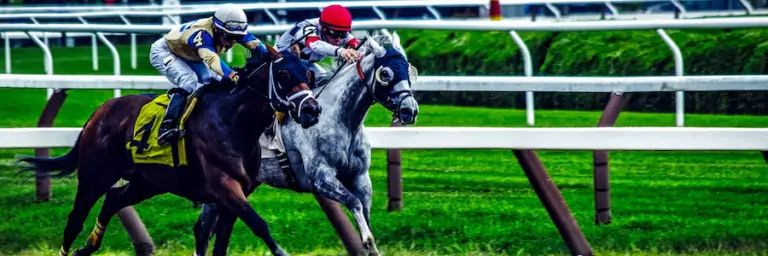Historical Horse Racing Machines: How They Work

Historical horse racing machines (HHRs) look and function much like slots from the user’s perspective, but they generate results using the outcomes of past horse races.
More importantly, historical horse racing gives players a slots-like experience in states where full-fledged slots aren’t legal. In short, it’s legal pari-mutuel horse racing betting with a slots-like patina.
How Historical Horse Racing Machines Work
Historical horse racing machines, also known as “instant racing,” are electronic gaming terminals that use past horse races to generate results.
Players feel like they’re playing slots, but technically, they’re betting on anonymized horse races that have already occurred (hence the term “historical”).
The terminal obscures the names and dates of the underlying races but provides a handicapping form so players can select three horses, just as they would at a live race.
However, most terminals offer a way for players to automate the selection process, so they end up playing a game that looks and feels just like a slot.
Only the last few seconds of the race are displayed on a small part of the screen. The rest of the monitor displays reels and symbols to show the player what, if anything, they won off the slot pull.
States With Historical Horse Racing Machines
Historical horse racing machines tend to appear in states that prohibit race tracks from offering slots.
Struggling race tracks nationwide have determined that historical horse racing terminals are among the best ways to compete with commercial, tribal, and out-of-state casinos for gamblers’ dollars.
A handful of states have formally legalized historical horse racing machines, while racing commissions in others have opted for the “do it now and apologize later” strategy. The latter approach rarely works and always leads to contentious debates.
Racing commissions in six states have authorized race tracks to install historical horse racing machines without legislative approval, but only Alabama has managed to keep its HHRs. In every other state that took this approach, the racing commission had to backtrack due to unfavorable attorney general opinions, lawsuits, or legislation.
Historical horse racing machines are available in seven states today:
Is Historical Horse Racing Gambling?
Unsurprisingly, there’s significant debate regarding the legality of HHRs.
One of the main points of contention is whether HHRs meet the legal definition of “pari-mutuel betting.” Also known as totalizator or tote betting, pari-mutuel wagering is legal in most states.
Minor nuances in the underlying mechanics of a historical horse racing machine often determine whether the machine is legal.
For example, the Kentucky Supreme Court ruled against a particular style of HHRs in 2020 because they didn’t pool customers’ wagers from identical horse races.
The machines in question showed three separate historical races to players, all incognito. The HHRs placed bets from multiple players into a shared pool, making them appear legal under Kentucky law.
However, the Kentucky Supreme Court decided that since players weren’t betting on the same races, the HHRs did not qualify as pari-mutuel wagering.
The Supreme Court put it this way in its decision:
“Without providing simultaneous access to one historical horse race to the same group of patrons, no pari-mutuel pool can be created among the patrons in which they are wagering among themselves, setting the odds and the payout.”
The evolution of instant racing machines also affected how anti-gambling activists and the courts perceive them. Early HHRs leaned heavily into the racing aspect, showing info from the racing form to the jockeys and the horses.
More recent iterations have largely abandoned the horse racing aesthetic in favor of a more “slots-heavy” approach, with spinning reels taking over and the actual horse racing videos getting less on-screen space.
Most historical horse racing machines even offer an auto-bet feature, eliminating the player’s need to pick a horse.
Modern HHRs resemble slots to such an extent that it’s hard to argue against opponents who say HHRs are just a way to exploit legal loopholes in states that prohibit slot gambling.
There’s no doubt these technological developments have stymied instant racing efforts in several states, and not without justification. After all, it’s not coincidental that slot machines are illegal or heavily regulated in states where race tracks have introduced historical horse racing machines.
Failed Attempts to Legalize HHR Machines
The racing industry and its regulators in multiple states have tried to lean on historical horse racing machines in the face of declining revenue and dwindling interest in live racing, but not all have succeeded.
The following states ran into hurdles in court or couldn’t get the state legislature on board and ultimately failed to keep historical horse racing machines at race tracks and simulcast racing locations.
A Brief History of “Instant Racing”
Eric Jackson, a General Manager desperately trying to save his failing Oaklawn Park race track in Arkansas, conceived the instant racing concept in the 1990s.
The first deployment of instant racing machines at Oaklawn Park in 2000 was successful, but it requires some help from the General Assembly to remove some legal restrictions related to simulcast racing.
Race tracks in other states soon followed suit after gaining approval from the relevant state authorities. But in Oregon and Wyoming, HHR machines were met with opposition from the State Attorney Generals, who questioned their status as pari-mutuel betting systems.
In 2006, the Wyoming Supreme Court characterized HHRs as a “slot machine that attempts to mimic traditional pari-mutuel wagering.” It would take another decade and explicit legalization efforts from the Wyoming legislature before HHR machines were allowed at race tracks and betting parlors.
Numerous other states have attempted to legalize and introduce instant racing machines. These attempts were dashed by Governors, Attorneys General, or courts questioning their legality.







